International Journal of Advancements in Technology
Open Access
ISSN: 0976-4860
ISSN: 0976-4860
Research Article - (2023)Volume 14, Issue 1
Video games are one of the most representative elements of digital revolution, creating an opportunity to influence both culture and markets, reuniting together recent and less recent media technologies. Despite its innovativeness and potentialities, video games are often underestimated in different areas, for example are hardly considered as art by many people, who consider video games a simple childish hobby, blamed to be silly, uneducative, dangerous to a proper children cognitive development and a waste of time. Video gamers are considered immature and video game creators are accused to exploit their gaming willing, which sometimes became an addiction.
Video games; Software house; Brand; Indie; Innovativeness
These negative attitudes towards video games and video gamers are disconfirmed by reality: Stereotypical video gamers age, socio economical status and gender are usually limited to a young-very young, poorly educated and male profile, while different studies underline that video games are played also by adults, educated and female individuals, among video gamers and developers. Video games are often accused to damage cognitive video gamers resources and encourage anti social attitudes, but exists a positive use of video games, helping professionals to treat some psychological and psychiatric impairment, positive and pro social attitudes also thanks to serious games [1]. Video games entrepreneurship can be considered innovative, managing a recent kind of product and has suffered an underestimation still present. As other products video games industry, due to its inner innovativeness, had to cope the risk of fail during its first launching years. Video games industry, especially during its first life decades, was tested to prove if it could be a solid industry or just a novelty and a few season fashion and the failure of production houses of video games console Amiga and Commodore during the 90’s was a crisis where this risk was more believable, evening considering the piracy influence, where many games can be freely downloaded without being bought [2].
Video games industry is like traditional other entrepreneurial models influenced by the usual mechanism, for example by a distinction between SME and multinational firms with the contraposition between new software houses and more resourceful brands, more stable and rooted during last decades, sometimes based on a conservative strategy contrasting the emerging game developers groups [3]. A proof of this regular underestimation of video games was realized during a totally unexpected burst of stock exchange value of securities belonging to the American video game consumer electronics gamestop, which reached during January 2021 a 1,500 percent increase and a consequent fast financial loss after a week. This unpredictable financial change is due probably to this underestimating attitude after video gaming and to the intervention of spontaneous and hardly monitoring investment on Reddit by free users and this can be considered an entrepreneurial innovative dynamics that can be acted in different other areas, giving important thinking opportunities. Video games industry is still an unexplored topic, with many potentialities research to be taken and exploited for a better thinking of entrepreneurial organization [4].
Software house firms survival
As we said before video game industry distinguished itself for being characterized by its strong inner innovativeness of a technological device. There is a strong risk within this kind of goodness to become obsolete or to fail to gain markets and being overwhelmed by other successful brands, an unavoidable aspect digital era, characterized by very fast innovations and a continuous renewal. Viewing Table 1 there is a list of software houses which are failed or acquired from other productions. Many of these software houses produced really important video games, which received important recognition among their categories and realized also important economic results during some years, but their business, after a positive feedback from market wasn’t able to be enduring and these software house didn’t success to face financial difficulties during harder times, getting on bankrupt, acquired or funded with stronger brands and being then dissolved, creating an important grief for many fans and sometimes creating hundreds of job place loss (Table 1) [5].
| Opening year | Closing year | Video game developer | Genre games producted |
|---|---|---|---|
| 1987 | 2001 | Bullfrog productions LTD | Real-time strategy, construction and management simulation, action |
| 1985 | 2003 | Westwood studios | Real-time strategy, role-playing video game, graphic adventure |
| 1958 | 2011 | Midway | Arcade games, fighting, action adventure, sport |
| 1996 | 2003 | Black Isle studios | Role-playng video game |
| 1987 | 1997 (acquisition year from electronic arts) | Maxis software | Life simulation, construction and management simulation, action, real-time strategy |
| 1982 | 2012 (acquisition from the walt disney company) | LucasArts | Graphic adventure, real time strategy, arcade games, role-playng video game, fliyng simulation, first person shooter, contruction and management, action adventure |
| 1990 | 2013 | THQ | Arcade, adventure, sport, real-time strategy |
| 1972 | 1992 | ATARI Inc | Arcade, action-adventure |
| 1980 | 1998 | Broderbund | Strategy, arcade, adventure |
| 1979 | 2008 | Sierra entertainment Inc | Strategy, contruction and management, action adventure, graphic adventure, real time strategy, arcade games, role-playng video game |
Table 1: List of software houses divided for opening and closing/acquisition yar, name society and main genre game producted.
Sometimes this software house ending was due to external causes, as we noticed in the case of LucasArts, which was just a sub division of Lucas film of the omonimous movie director and producer George Lucas, creator of famous star war saga and merchandise who finally sell his rights to the walt disney company. Many of them had a short successful period and then dissolved [6]. The other software houses are expired/dismissed because have sometimes failed to reach their selling objective, sometimes for a wrong production, distribution, marketing strategy or a needs evaluation of their potentially buyers. There are many factors to be count in this case, some based on the gameplay, balancing difficult, replayability, fun and innovativeness; some on graphical performance, which has to be aesthetically good, fluid, controlling “bugs” and “glitch” and coherent to hardware users at the time of the video game release [7]. Video games industry had to cope during last decades to fight against piracy, which has caused the lost of an important income for software houses, adding another factor that has to be evaluated during the release phase. There is a sort of war between piracy and software house economic interest, where each try to find new strategies to fight the other side [8].
To improve selling video games produced have created innovative release strategies differing by traditional purchasing way. Differently by past, where all video games had to be bought at dedicated video games shops on a physical version with a box, a manual and a physical CD or DVD, the most of new video games generation can be downloaded on the internet, using specialized video games platforms, paying online. While in past many video games where illegally downloaded for free internet had become also a way to purchase them, becoming an instruments of software houses [9]. To improve earnings there was introduced the DLC. The DLC (DownLoaded Content) is an additional content created for an already existing released video game, downloadable with an additional cost. This is a convenient strategy for software houses, because the basic video game can be released before his plenty finishing and the video game is going to be completed on a second time, where the missing content is bought in a second time by user, who usually is motivated on buy this second part if he like the first one. It means that, differently by past, where a complete video game costed $50, today is purchased for $50, but is released incomplete and to complete it the user should but another 2-3 by $5 each one. Another lucrative strategy is the introduction of multiplayer, which power replayability with the same video game and the number of players around the world. Video games market has a double difficult because the video game depends by a technological device where it’s installed, it means that both the video game publisher and the computer or its console have to cope economic difficulties [10].
A strategic planning has to consider both software aspect, related to the video game qualities itself, both gameplay and graphical performance and hardware aspect, related to the video gamer’s performance device, considering also the need to release the video game in the right moment, reducing risk for a leak by hacker [11]. An example of a failed release planning was the experience of “Cyberpunk 2077” from CD project RED, released among different device between December 2020 and 2021 beginning. This game had a long project phase, delayed by different development and administrative changing, creating an excessive hype among users, was then released too fast, without consider his different graphical bugs and that many console, excepted more advanced, didn’t support the high graphical performance. These different problems (without consider usual protests from parent’s associations due to explicit language and game’s contents) created significant unsatisfaction among video gamers, who massively asked for a refund of their purchased games [12].
Like in the other entrepreneurial business, video games industry has some multimillionaire solid firms which are rooted on marked and have erased their competitors and reinforced their brand, their commercial strategy and their precise catchment area represents more important software houses for economic power, year foundation and game genre (Table 2) [13].
| Opening year | Revenue | Video game developer | Genre games producted |
|---|---|---|---|
| 1993 | $13.4 billion | Sony computer entertainment | Action, sport, fighting, arcade, adventure, cards, realt strategy game, flight simulator, life |
| 1975 | $12.82 billion | Xbox and Microsoft studios | Real time strategy, flight simulator, first person shooter, sport, cards |
| 1889 | $6.28 billion | Nintendo | Arcade, adventure, cards |
| 1951 | $4.9 billion | SEGA | Arcade, real strategy game, first person shooter |
| 1991 | $4.85 billion | Activision Blizzard | Arcade, real strategy game, role playng game, cards, first person shooter |
| 1955 | $4.74 billion | Namco Bandai | Arcade, flight simulator, sport, fighting |
| 1982 | $4.14 billion | Eletronic arts | First person shooter, role playng video game, sport, life simulation, construction and management simulation, action, |
| 1969 | $3.24 billion | Konami | Action, dynamic adventure, arcade, fighting, sports |
| 1986 | $1.85 billion | UbiSoft | Action, dynamic adventure, stealth, first person shooter |
| 1975 | $1.26 billion | Square Enix | Action, role playng Video game, arcade, dynamic adventure, stealth |
Table 2: list or richest software houses.
In this case we are showing some multi millionaire productions, some of them are subsidiaries of firms which operates in area different from video games as Microsoft or Sony, having their firms the opportunity of diversifiy their investments. While we use to have a clear distinction between hardware component the physical technological device and the software which comprehends all instructions and data that grant to the device to work, creating working programmes or video games some important video games producers, without resources limitation of minor software houses, can project and produce both hardware components and software with the video game itself, for example with some video games created by the same multinational which have created their console, citing the example of Halo series, where the first episode was produced by a software house financed by Microsoft to be played with the Xbox, a console in turn controlled by Microsoft itself [14]. This episode is related to a strong rivalry between video game multinationals, where in this case Microsoft was planning to create an American console to respond to the Japanese Playstation. The release of Halo, exclusively developed to be released for this new console, can be considered metaphorically a sort of first decisive victorious battle for Microsoft because on the release date of Halo on the Xbox there was a successful sale and was not just effective respond to Playstation, with a more strict anti-piracy system compared to it, but also an important result, because Halo was a project to be released on MacIntosh, a device which didn’t belong to Microsoft [15].
Video game majorities and indie software house confrontation
As we said before major software houses are resourceful and with their potential have survived against difficulties on markets, differently by other software houses which are vanquished during sector crisis, for new difficulties or external economic equilibrium [16]. Many software houses have based their power on aggressive marketing and acquisition strategies, promoting their new edition using web videos, advertising techniques, creating movies, conferences, comics, using a lot of economic resources, really far from minor software houses economic possibilities [17]. These firms are reaching a sort of economic invincibility and are rooting on market consolidating their strategy and market and branding attitude, sometimes being conservative on their strategy, having with these reached a significant brand solidity ad their portion of loyal video gamers, who probably are going to continuing to buy video games edited by then and these firms aren’t moved to create new different games really divergent and innovative: Pro evolution soccer 2019th is not really different from the 2008th edition, except for different soccer players and graphical performance, but we can notice this also for Super Mario saga, where a significant modification on gameplay could by perceived with discomfort by most of video gamers [18]. Despite this situation, where the most portion of market is occupied and monopolyzed by these most important firms, fundamentally with the usual and linear video games, publishing new titles without fundamental innovations, exist another portion of video gamers who want novelty, innovativeness and sensitivity about some social aspects and this need is satisfied by indie software houses, a smaller software house which try to create vdeo games with innovative gameplay and original plots avoiding styles of paly already taken by traditional and bigger firms and using innovative way to product and release their new games. On this way there is a temporary balancing between multinationals, privileging their brand strength to innovativeness and independent software houses, weaker and with more failing risk but moved to create innovative and more refined productions [19].
Study design, exclusion/inclusion criteria and used instruments
For this state of art study about video games entrepreneurship we used SCOPUS, WOS and EBSCO to collect all records including articles or review mentioning this Research area. We used a Boolean string combining keywords entrepreneur* AND video game* OR video game*, excluding journal articles, books, conference papers and notes and records without reference. We excluded records regarding by the 2021 [20].
Database description
Despite video games are existing by 70 years and have been diversified in a variegated list of video game category in complexity, style, technological device and type of video gamer for gender and age they are addressed to, research about this topic are recent, perhaps because during the last decades of XX century and especially after the video game crash in 1983 this market was considered considered without future after a brief successful period. For this research we review records using PRISMA statement (Figure 1).
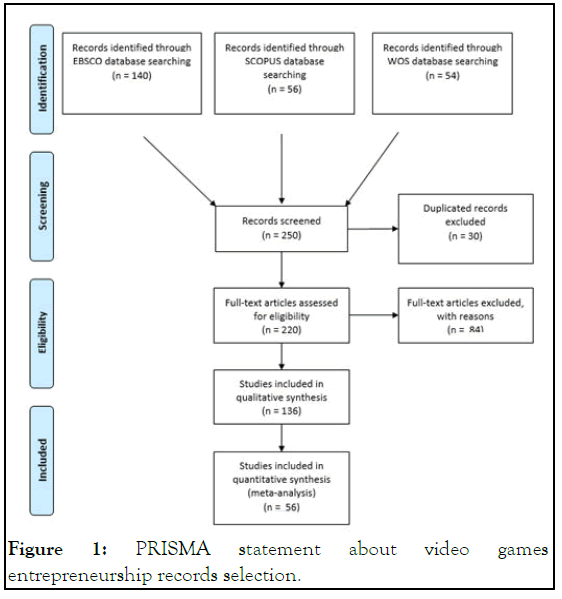
Figure 1: PRISMA statement about video games entrepreneurship records selection.
In Figure 1 we represented records selection considering duplicated records removal and their exclusion by our review because some records were fare by our topic about video games entrepreneurship. At the end we considered just 56 records from SCOPUS to create a cluster representation. To define Research trend about video games during las 20 years, considering that before there is not an interesting number about it we’ve noticed an incrementation trend during last 10-15 years, with a boorst by 2015 and a mild delay during 2020 (probably due to a significant economic activity stop around most of world due to the pandemic) (Figure 2).
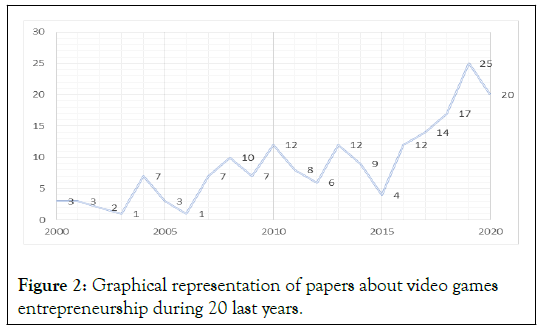
Figure 2: Graphical representation of papers about video games entrepreneurship during 20 last years.
Since the records group is pretty poor there aren’t authors who write more than 2 papers about video games entrepreneurship, emerge three research line headed by HEC Montreal, Canada (Cohendet, Simon), Kelley school of business, USA (Zhao, Ishihara, Jennings) and Universidad EAFIT, Medellin, Colombia (Mesa, Solarte) as we can see in Table 3.
| No. | Author | Affiliation | h-index | Prevailing research area |
|---|---|---|---|---|
| 1 | Simon LO | HAEC, Montreal, Canada | 12 | Business management accounting, economics social sciences, psychology, engineering |
| 2 | Cohendet PS | HAEC, Montreal, Canada | 19 | Business management accounting, engineering, computer science, psychology |
| 3 | Jennings PD | University of Alberta, Canada | 16 | Business management accounting, psychology, social sciences, economics, econometrics, environmental science |
| 4 | Ishihara M | Leonard N. Stern school of business, NY, USA | 6 | Business management accounting decision science |
| 5 | Zhao EYF | Kelley school of business, USA | 10 | Business management accounting, economics, econometrics and finance |
| 6 | Solarte HA | Universidad EAFIT, Medellin, Colombia | 0 | Social science, energy, environmental science |
| 7 | Mesa JH | Universidad EAFIT, Medellin, Colombia | 0 | Social science, energy, environmental science |
| 8 | Burger-Helmchen T | Universite de Strasbourgh | 8 | Business management accounting, economics social sciences, decision science |
Table 3: List of publishing authors defined by published papers about video games entrepreneurship, h-index and prevailing research area.
Papers about video games entrepreneurship were posted on different journals where, as we see in there are minor journals, but also important publishers characterized by high h-index, underlining how much this phenomenon can be significantly interesting also among important scientific journals (Table 4).
| No. | Journals | h-index | Research area |
|---|---|---|---|
| 1 | Convergence | 36 | Arts and humanities (miscellaneous), social science, communication |
| 2 | Interactive technology and smart education | 18 | Computer science, E-Learning |
| 3 | Journal of business venturing | 170 | Busines, management accounting, management technology and innovation |
| 4 | Journal of small business and enterprise development | 61 | Business management accounting, strategy and management |
| 5 | Research policy | 224 | Business, management and accounting, management technology and innovation, engineering (Miscellaneus) |
Table 4: List of publishing authors defined by issues number where they were treating this topic, by h-index and prevailing research area.
Used instruments
To evaluate authors and journals bibliometric characteristics we used database functions and SCImago, while we used VosViewer to create a cluster map from 56 selected records from SCOPUS, charging the .csv file on VosViewer. Since there is a poor number of records we used this number calculating a minimum number of 3 co-occurrence from all keywords.
Cluster analysis
Emerged a cluster map of 3 clusters that we represent and we had defined confronting its keyword with the record group on SCOPUS (Figure 3).
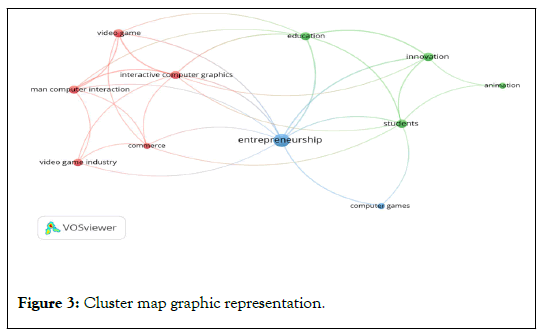
Figure 3: Cluster map graphic representation.
Cluster (red) 1: Video games business (5 items, 13 records)
This first cluster covers a 23% of the records global distribution and regards the monetary area of video game industry. This cluster represent the entrepreneurial soul of video game industry that can be defined industry because a Video game is the result of a complex intervention between creative components within creation and marketing campaign, but also a technical knowhow which grant a satisfying performance, a proper economic planification to obtain a commercial competitive approach to obtain selling goals of the business and maintain a right relationship with consumers between the brand, the video game and the video gamer.
Cluster (green) 2: Social and technical innovativeness (4 items, 13 records)
This second cluster, equivalent to the first one (23% of cooccurrence on all records) regards innovativeness within video game industry, going beyond a simple earning goal which strongly determinates the others. This cluster is focused on the inner innovativeness within video games, which can regards video game original qualities by the gameplay or performance point of view, but the video game can also adopt a social function in the education or on a social sensitization area to a precise user target needing a special education in some area.
Cluster (blue) 3: Software houses entrepreneurship (2 items, 15 records)
That’s the cluster with the most numerous co-occurrences (26% co-occurrence on all records) leaving, added to the two others, a residual number of records without a relation between them. There is a shot but significant difference with the first cluster. Both of them consider the entrepreneurial part of the video games business, having the entrepreneurial component a fundamental economic part. Despite this similarity, is important underline that with this cluster we are considering computer games and not console games, despite many titles are released by both console and computer. In this case we consider PC games entrepreneurship a special one, because computer software houses produce video games but also working software and some of these (for example Microsoft, which produce both video games and operating systems) have to manage different business, having a superior complexity.
Interactive video games cluster
Using VosViewer we revealed some ulterior clusters which comprehend some transversal keywords. One of the most characteristic of video games is their possibility to be interactive, differently by other kind of entertainment. The key word interactive computer games is a tracking key word (link strength=14, Occurrences=5) which regards both the entire cluster 1 and part of cluster 2 (except for animation keyword), satisfying commercial and education’s needs as we can see in Figure 4.
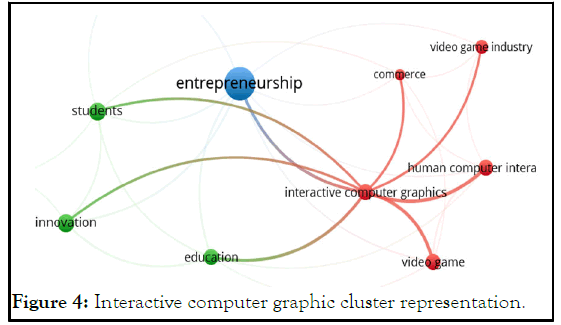
Figure 4: Interactive computer graphic cluster representation.
There is another version, where there is a superior focus on educational programmes, focusing this time on students (link strength=10, Occurrences=6), where video games are used by students to improve their learning competencies, this times including keywords from the entire clusters 2 and 3 and part of cluster 1 (interactive computer graphics and commerce), pursuing educational, innovation, technical and commercial goals at the same time, like the commercialization of serious games that have reached this double goal, as we can observe in Figure 5.
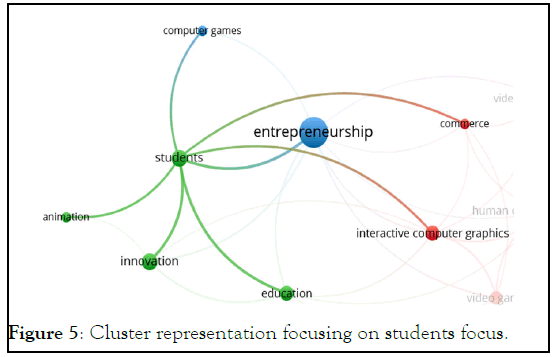
Figure 5: Cluster representation focusing on students focus.
With this paper we aim to follow an emerging research line, an area for a too long time underestimated probably because linked to a stereotype which consider badly who plays and/or who operate on video gaming world by the moral, psychic and economic point of view. Video games are plenty of potentialities in entrepreneurial, intellectual, learning terms and growing an interesting research line which have a positive and interesting trend for future a Research papers significant incrementation started by 2015 and probably incrementing in future, as we had evidenced. Many video games can improve social and economic reasoning, teach important notions, help in resolve some important problems and sometimes treat some research questions. An emblematic feature of video games is that there is not a frequent separation between the user and the video game developer/entrepreneur, especially due to some recent financing and developing strategies as the introduction of crowd funding, where there is a spontaneous found raising (and the mod developing, where a video game can by modified on different versions. It means that the entrepreneurial process, which can be usually simple and easily identifiable and manageable, becoming more unpredictable. We can state that video game entrepreneurship is divided between big multinational software houses, with solid brands and financial resources, but rooted on market and less motivated to product original titles and minor software houses, economically more vulnerable, but oriented to produce video game more original and complex.
In conclusion video games industry has survived to important market crisis and to customers evolution, who have become more demanding about the video game and its technological device performance, coping a piracy activity which give to unsatisfied users to download illegally a video game which are not going to buy. Video games industry is not only just a business totally interested on earnings, many software houses push to produce video games that can be considered a form of art used also on teaching, on training programmes. Like on the other entrepreneurial area, a software house has to adopt different strategies, if to focus its investment just on a single area or diversify. Differently by other business video game industry has to invest in innovation because in this technological area device and software become faster obsolete than in other area. It doesn’t mean that in the name of the progress a software house has to deny a link with past, especially if it means to go against their brand. Video game industry, if we consider, has already begun to innovate itself, because has gone beyond a simple earning and entertain goal which had during its first time with first arcade video games, which were just used to play and have fun during the free time of kids, now many video games are refined, smart, many times are used in adult activities, on educational programmes, sometimes in research projects. Video games industry is not just an industry creating thousands of job places and generating millions of money, but can be also an interesting area which encourage critical thinking and reasoning.
[Crossref] [Google Scholar] [PubMed]
[Crossref] [Google Scholar] [PubMed]
Citation: Pascucci T, Sanchez BH, Garcia JCS (2023) Video Games Entrepreneurship: A Confrontation between Strong Multinational and Indie Software House. Int J Adv Technol. 14:235.
Received: 27-Dec-2022, Manuscript No. IJOAT-23-9304; Editor assigned: 29-Dec-2022, Pre QC No. IJOAT-23-9304(PQ); Reviewed: 12-Jan-2023, QC No. IJOAT-23-9304; Revised: 19-Jan-2023, Manuscript No. IJOAT-23-9304(R); Published: 27-Dec-2023 , DOI: 10.35248/0976-4860.23.14.235
Copyright: © 2023 Pascucci T, et al. This is an open-access article distributed under the terms of the Creative Commons Attribution License, which permits unrestricted use, distribution, and reproduction in any medium, provided the original author and source are credited.